Curcumin for Inflammation and Mental Clarity in Dissociation
Introduction
When you live with dissociation, the world can feel muffled — like you’re watching your own life through a fog. Emotions dull, energy drains, and even thinking clearly can feel like trying to see underwater. While dissociation is primarily a protective response of the nervous system, it’s also deeply biological. Underneath that mental fog often lies a state of chronic inflammation — an overactive immune response that keeps the brain and body locked in defense mode.
One of the most promising natural compounds for addressing this underlying inflammation is curcumin, the bright yellow pigment found in turmeric. Used for thousands of years in traditional medicine, curcumin is now backed by modern neuroscience as a powerful anti-inflammatory, antioxidant, and neuroprotective molecule.
For people living with dissociation, curcumin may help by calming inflammation in the brain, protecting neurons from oxidative stress, and supporting neurotransmitter balance — all essential for restoring clarity, connection, and presence 🌞.
Looking for supplements for This? Click here.
Dissociation and Inflammation: The Hidden Link 🔥
Dissociation is often described as a mental escape from overwhelming experiences. But physiologically, it’s the body’s last line of defense against prolonged stress or trauma. When fight or flight is impossible, the nervous system shifts into freeze mode, slowing heart rate, dulling awareness, and conserving energy.
Over time, this shutdown state becomes wired into biology. Stress hormones like cortisol and adrenaline remain chronically imbalanced, immune cells stay activated, and inflammatory chemicals (called cytokines) flood the bloodstream.
This chronic, low-grade inflammation doesn’t just affect the body — it changes the brain. Neuroinflammation disrupts communication between brain regions responsible for awareness, emotion, and self-regulation. Areas such as the prefrontal cortex and insula — which help integrate thoughts, sensations, and feelings — become underactive.
The result is that characteristic dissociative fog: mental confusion, emotional numbness, fatigue, and loss of focus.
Reducing inflammation is therefore not only about physical health — it’s a crucial step toward mental clarity and reconnection.
What Is Curcumin? 🌿

Curcumin is the primary active compound in turmeric (Curcuma longa), a golden spice native to South Asia. Beyond giving turmeric its vibrant color, curcumin acts as a potent antioxidant and anti-inflammatory agent, influencing multiple biological pathways.
Modern studies have shown that curcumin can cross the blood-brain barrier, allowing it to directly affect the brain’s immune cells (microglia), neurotransmitter systems, and even mitochondrial function — all of which play roles in dissociation-related brain changes.
In simple terms, curcumin helps the body calm its inflammation alarms, clear oxidative waste, and restore balance to systems that chronic stress has overactivated.
The Role of Neuroinflammation in Dissociative Fog 🌫️
The brain contains specialized immune cells called microglia. When the body is under prolonged stress or exposed to trauma, these microglia become chronically activated, producing inflammatory molecules like IL-6, TNF-alpha, and IL-1β.
These molecules interfere with neurotransmitter function, slow synaptic communication, and impair neuroplasticity — the brain’s ability to form new, adaptive connections.
In practical terms, this creates a state of neurobiological disconnection.
Cognitive symptoms include:
Difficulty focusing or remembering details
Feeling mentally “foggy” or detached
Trouble processing information
Emotional blunting or flattened affect
Curcumin helps by quieting overactive microglia, reducing cytokine levels, and protecting neurons from oxidative damage. When brain inflammation subsides, communication between regions improves — and so does the sense of connection between thoughts, feelings, and body.
How Curcumin Calms the Brain 🧠✨
Curcumin’s power lies in its ability to modulate multiple molecular pathways simultaneously.
Reducing Pro-Inflammatory Cytokines
Curcumin inhibits NF-κB, a master regulator of inflammation. By doing so, it lowers levels of IL-6 and TNF-alpha — two cytokines linked to depression, anxiety, and cognitive dysfunction.
Antioxidant Defense
Chronic stress and trauma generate free radicals — unstable molecules that damage brain cells. Curcumin boosts antioxidant enzymes like glutathione and superoxide dismutase (SOD), neutralizing oxidative stress and preventing cellular damage.
Supporting Neurotransmitter Balance
Curcumin increases levels of serotonin, dopamine, and BDNF (Brain-Derived Neurotrophic Factor) — molecules essential for mood, motivation, and mental clarity. This is especially relevant for dissociation, where serotonin and dopamine levels often plummet due to stress overload.
Enhancing Neuroplasticity
By promoting BDNF, curcumin helps neurons form new synapses and repair old ones. This rewiring supports emotional integration and memory consolidation — both of which are impaired in trauma-related dissociation.
Together, these effects make curcumin a powerful ally for clearing the fog that dissociation leaves behind.
The Gut–Brain Connection: Inflammation from the Inside Out 🦠
One reason curcumin is so effective for mental clarity is its influence on the gut–brain axis.
Chronic stress disrupts the gut microbiome, leading to inflammation that travels from the intestines to the brain — a process known as the inflammatory cascade. When the intestinal lining becomes “leaky,” inflammatory molecules enter circulation, crossing the blood-brain barrier and amplifying neuroinflammation.
Curcumin helps seal the gut barrier by reducing intestinal permeability and promoting beneficial bacteria. Studies show that it increases populations of Lactobacillus and Bifidobacterium, while suppressing harmful species that fuel inflammation.
This gut-level repair reduces systemic inflammation and stabilizes serotonin production — since most of the body’s serotonin originates in the gut.
For people with dissociation, this means curcumin may not only clear mental fog but also restore the body’s internal sense of safety.
Mitochondrial Function: The Energy Behind Awareness ⚡
Mitochondria are the powerhouses of cells, producing the energy (ATP) that fuels brain activity. Under chronic stress or inflammation, mitochondrial function declines, leaving the brain fatigued and sluggish.
This energy depletion is one reason dissociation feels like low power mode — your system is conserving energy because it doesn’t have enough to fully engage.
Curcumin supports mitochondria by improving their efficiency, reducing oxidative stress within them, and stimulating the creation of new mitochondria (a process called mitochondrial biogenesis).
This translates into more consistent mental energy, sharper focus, and less of that heavy mental fog that often accompanies trauma-related disconnection.
Curcumin and the HPA Axis: Resetting Stress Rhythms 🌙
The hypothalamic-pituitary-adrenal (HPA) axis governs the body’s stress response by controlling cortisol release. In people with chronic trauma, this system becomes dysregulated — sometimes producing too much cortisol (hyperarousal) or too little (collapse and fatigue).
Curcumin helps restore balance to the HPA axis. Animal and human studies show that it normalizes cortisol levels, reduces adrenal overstimulation, and promotes steady circadian rhythm patterns.
This regulation helps the body shift from survival mode to recovery mode — allowing for more stable mood, better sleep, and improved emotional regulation.
Looking for supplements for This? Click here.
Curcumin and Mental Clarity: Clearing the Fog 🌞
When inflammation decreases and energy production stabilizes, clarity returns. People often describe this as “the fog lifting.”
Curcumin supports this transformation by enhancing blood flow to the brain and improving oxygen utilization. It also reduces amyloid accumulation — sticky proteins that can slow neural communication.
In one study, participants taking curcumin for 8 weeks showed significant improvements in working memory and attention span, as well as reduced fatigue and anxiety.
For those recovering from dissociation, these effects translate into a renewed sense of mental presence — the ability to think clearly, feel emotions, and stay engaged with reality.
Curcumin and Neurotransmitters: Reconnecting Emotion 💫
One of the most debilitating aspects of dissociation is emotional disconnection — the sense that you can’t feel joy, sadness, or even your own body fully.
This emotional blunting often arises from disrupted neurotransmitter signaling. Curcumin supports emotional reconnection through multiple mechanisms:
Boosting serotonin: Curcumin inhibits monoamine oxidase (MAO), an enzyme that breaks down serotonin and dopamine.
Supporting dopamine: It enhances dopamine synthesis, improving motivation and engagement.
Regulating GABA: Curcumin stabilizes GABA levels, reducing anxiety and overactivation.
When neurotransmitter balance is restored, emotions begin to flow again. You feel more grounded, responsive, and capable of connection — the opposite of dissociation’s frozen detachment.
Enhancing Curcumin Absorption: The Role of Piperine 🌶️
Curcumin by itself is poorly absorbed, but pairing it with piperine, the active compound in black pepper, increases absorption by up to 2,000%.
For this reason, many high-quality supplements include both curcumin and piperine (or black pepper extract). Alternatively, consuming turmeric with a fatty meal — such as avocado, olive oil, or coconut milk — enhances bioavailability because curcumin is fat-soluble.
Taking curcumin consistently, ideally with meals, allows its anti-inflammatory and neuroprotective effects to build gradually over time.
Combining Curcumin with Other Brain Support Nutrients 🌿💊
Curcumin pairs well with other natural compounds that target inflammation, energy, and neurotransmitter function:
Omega-3 fatty acids: Strengthen cell membranes and amplify anti-inflammatory effects.
Magnesium glycinate: Supports GABA activity and relieves tension.
B vitamins (especially B6, B9, B12): Support methylation and neurotransmitter synthesis.
CoQ10: Enhances mitochondrial energy production.
Probiotics: Complement curcumin’s gut-healing and serotonin-boosting effects.
Together, these nutrients create a biochemical environment conducive to clarity, stability, and emotional integration.
Looking for supplements for This? Click here.
Curcumin and the Vagus Nerve: Rebuilding Inner Safety 🌬️
The vagus nerve acts as the body’s internal communication line between gut, brain, and heart. In trauma survivors, this nerve often becomes dysregulated — either overactive (causing anxiety) or underactive (causing shutdown and detachment).
Curcumin indirectly supports vagal function by reducing inflammation in the gut and brain. This helps restore vagal tone, allowing the body to shift more easily from defensive states to relaxation and connection.
When vagal tone improves, symptoms like depersonalization, fatigue, and digestive imbalance begin to ease. The body feels safer, and the mind can reengage.
Research Highlights 🧪
A 2017 meta-analysis in Phytotherapy Research found that curcumin significantly reduced depressive and anxiety symptoms in both clinical and subclinical populations.
A 2018 study in Nutrients confirmed curcumin’s ability to increase BDNF and improve cognitive performance in adults.
Research in Frontiers in Aging Neuroscience (2018) showed that curcumin supplementation improved memory and attention while reducing markers of oxidative stress.
Animal models indicate curcumin reduces microglial activation and preserves synaptic plasticity — mechanisms directly tied to trauma-related cognitive dysfunction.
Together, these findings position curcumin as one of the most evidence-supported natural compounds for improving both brain health and emotional resilience.
Emotional Healing Through Biochemistry 💞
While supplements can’t replace therapy, they can create the internal stability necessary for emotional work to succeed. In trauma and dissociation, the brain is often too inflamed or underpowered to sustain presence. Curcumin helps restore the foundation — reducing the biochemical “noise” that keeps you disconnected.
As inflammation calms and neurotransmission normalizes, you may notice a shift: clearer thoughts, easier emotional expression, fewer energy crashes. It becomes possible to engage in therapy, relationships, and mindfulness practices without slipping into overwhelm or detachment.
Curcumin, in essence, supports the biology of presence — the state where your body and mind can finally exist in the same moment.
Integrating Curcumin Into a Healing Routine 🌿🕊️
Curcumin works best when combined with other healing practices that regulate the nervous system:
Mindful breathing activates the vagus nerve and reduces cortisol.
Want to try Breathwork? Click Here.
Adequate sleep allows BDNF-driven repair.
Gentle movement (like yoga or walking) enhances blood flow and reduces inflammation.
Therapeutic journaling or somatic therapy helps integrate emotions as biochemical stability returns.
Looking for online therapy ? Click Here.
Healing dissociation is not about forcing yourself to “wake up.” It’s about nourishing your system so it no longer needs to hide.
Curcumin provides part of that nourishment — a molecular signal that it’s safe to reconnect.
Safety and Considerations ⚠️
Curcumin is generally safe and well-tolerated. Mild digestive upset may occur at high doses, especially on an empty stomach.
People on anticoagulant medications (like warfarin) or with gallbladder issues should consult a healthcare provider before use, as curcumin may affect bile production and clotting.
A typical therapeutic range is 500–1,000 mg per day of standardized curcumin extract with piperine, divided into two doses.
Consistency matters — long-term, steady supplementation builds cumulative benefits.
From Inflammation to Illumination 🌟
Dissociation dims the connection between mind and body, but curcumin helps bring light back to that pathway. By reducing neuroinflammation, boosting serotonin and dopamine, and stabilizing the stress response, it helps rebuild the biological ground for clarity, safety, and emotional presence.
You may not feel transformation overnight, but with time, curcumin’s effects are like sunlight breaking through clouds — slow, steady, and illuminating.
The mind begins to wake up. The fog lifts. The body feels more alive.
And in that space of clarity, healing can finally take root. 🌿💛
Looking for online therapy ? Click Here.
References
Lopresti, A. L. (2018). “The mechanisms underlying curcumin’s antidepressant effects.” Nutrients, 10(9): 1172.
Hewlings, S. J., & Kalman, D. S. (2017). “Curcumin: A review of its effects on human health.” Foods, 6(10): 92.
Cox, K. H., et al. (2015). “Curcumin supplementation improves mood and working memory.” Journal of Psychopharmacology, 29(5): 642–651.
Esposito, E., & Cuzzocrea, S. (2010). “Anti-inflammatory properties of curcumin in neurodegenerative diseases.” Neurochemical Research, 35(8): 1410–1421.
Jurenka, J. S. (2009). “Anti-inflammatory properties of curcumin.” Alternative Medicine Review, 14(2): 141–153.
Reuter, S., et al. (2011). “Molecular targets of curcumin in inflammation and cancer.” Pharmacological Research, 62(2): 131–142.
Lanius, R. A., et al. (2018). The Neurobiology and Treatment of Trauma-Related Dissociation. Routledge.
van der Kolk, B. A. (2014). The Body Keeps the Score. Viking.
Panahi, Y., et al. (2016). “Curcumin and oxidative stress.” Complementary Therapies in Medicine, 29: 1–7.
Gopinath, K., et al. (2019). “Neuroprotective and cognitive-enhancing effects of curcumin.” Frontiers in Aging Neuroscience, 11: 178.
Related Posts
-

Ashwagandha and Co-Dependency: Supporting Stress Resilience
Stress is more than a feeling—it’s a full-body signal that your system is overwhelmed. When the mind races and the body tenses, your hormones, breathing, and focus all shift into survival mode. Chronic stress doesn’t just affect emotions—it reshapes your nervous system, drains your energy, and clouds your clarity. Learning to understand and manage stress gently is the first step toward peace, balance, and true recovery. 🌿💫
-

Why Co-Dependency Feels Draining: Adrenal Fatigue and Supplements That Help
The adrenal glands are small but powerful organs that sit above your kidneys, acting as your body’s built-in stress managers. They produce hormones like cortisol and adrenaline that help regulate energy, mood, and resilience. When they’re overworked from chronic stress or emotional exhaustion, fatigue and imbalance follow. Supporting adrenal health naturally can help restore calm, energy, and hormonal balance. 🌿⚡
-

The Link Between Anxiety, Co-Dependency, and Natural Support
Anxiety feels like living in constant alert mode—your heart races, your thoughts loop, and your body can’t find peace. It’s the nervous system’s way of preparing for danger, even when none exists. Understanding what’s happening in your mind and body is the first step toward calming the storm and restoring balance. 🌿💫
-

Supplements That Support Dopamine and Serotonin in Co-Dependent Patterns
Serotonin is the neurotransmitter of calm, confidence, and contentment. When it’s balanced, you feel peaceful and emotionally grounded. When it’s low, anxiety, mood swings, and emotional dependence take over. By understanding serotonin’s role in emotional health—and how to support it naturally—you can rebuild inner stability, improve relationships, and cultivate lasting happiness from within. 🌞💫
-

How Emotional Exhaustion in Codependency Impacts the Nervous System
The nervous system is the body’s communication network, connecting the brain to every organ and muscle. It regulates stress, mood, and emotion through a delicate balance of electrical and chemical signals. When overwhelmed, it can become dysregulated—leading to fatigue, anxiety, and emotional imbalance. Understanding how to calm and strengthen the nervous system is key to healing from chronic stress and emotional burnout. ⚡🌿
-

What Is Co-Dependency? The Role of Brain Chemistry and Stress
Stress is more than a feeling—it’s a full-body experience that begins in the brain and ripples through every cell. When cortisol surges and the nervous system stays on alert, your body can’t rest or recover. Over time, this constant tension affects energy, focus, mood, and even immune health. Understanding stress chemistry is the first step toward breaking free from burnout and finding calm again. 🌿
-

Creating a Supplement Stack for Motivation, Energy, and Anti-Procrastination
Motivation is the fuel behind every meaningful achievement—but it’s not just about willpower. It’s a mix of mindset, brain chemistry, and momentum. When energy, focus, and purpose align, action feels natural instead of forced. Learn how to harness motivation as a daily state, not a fleeting feeling.
-

Supplements for Building Consistency and Reducing Chronic Procrastination
Biochemistry is the bridge between biology and chemistry—the science of life at the molecular level. It explains how nutrients, hormones, and neurotransmitters interact to create energy, thought, and emotion. From brain function to muscle movement, biochemistry reveals the invisible processes that sustain health, balance, and vitality.
-

GABA and Procrastination: Supporting Calm Focus for Productivity
GABA is the brain’s natural calming messenger—a neurotransmitter that helps slow mental overactivity and ease stress. When GABA levels drop, focus fades, anxiety rises, and procrastination becomes more likely. By supporting GABA through nutrition, lifestyle, and supplements, you can restore calm clarity, improve focus, and take action with steady, balanced energy.
-

Ashwagandha and Procrastination: Lowering Stress to Improve Action
Science is the language of curiosity and discovery. It helps us understand the hidden patterns behind life, energy, and the universe. Through experimentation and critical thinking, science connects imagination to evidence—turning questions into knowledge. Whether through microscopes, molecules, or minds at work, science represents our endless pursuit of truth and innovation.
-

Neurotransmitters and Motivation: Supplements That Support Drive and Focus
Supplements can do more than boost physical health—they can also enhance mental clarity, focus, and motivation. Nutrients like omega-3s, magnesium, B vitamins, and adaptogens help balance neurotransmitters, stabilize mood, and support brain energy. When combined with good sleep, nutrition, and mindful habits, they can transform how your brain performs under stress.
-

How Stress Hormones Like Cortisol Fuel Procrastination (and What Helps)
Blood sugar isn’t just about physical health—it directly impacts focus, mood, and motivation. When glucose levels spike and crash, energy and attention do the same, fueling procrastination and brain fog. Learning how to stabilize blood sugar through balanced meals, mindful habits, and key nutrients helps keep your mind steady, focused, and ready to act.
-

Brain Fog and Procrastination: Supplements for Mental Clarity
Brain fog can turn even simple tasks into mental hurdles. When your thoughts feel slow and unclear, procrastination often follows—making focus and productivity seem impossible. This article explores the biochemical and lifestyle causes of brain fog and reveals the most effective supplements for restoring mental clarity, focus, and sustained energy.
-

The Link Between Low Energy and Procrastination: Can Supplements Help?
Neurochemistry shapes how we think, feel, and act. When neurotransmitters like dopamine, serotonin, and GABA fall out of balance, it can lead to fatigue, anxiety, or lack of motivation—fueling procrastination and low mood. Understanding the brain’s chemical communication system helps us find ways to restore focus, calm, and emotional stability through nutrition, mindfulness, and targeted supplements.
-

Why Do We Procrastinate? The Role of Dopamine and Supplements That Support It
Dopamine is the brain’s motivation messenger—the chemical that fuels focus, reward, and drive. When dopamine levels drop, even simple tasks can feel impossible to start. This article explores how dopamine shapes procrastination, motivation, and mental energy, along with natural supplements and daily habits that help restore balance and get things done.
-

Phosphatidylserine and Stress Reduction for People with BDD
Stress is more than a mental state—it’s a full-body experience that affects hormones, brain chemistry, and emotional balance. For people with Body Dysmorphic Disorder (BDD), constant tension and worry about appearance can overload the nervous system. Learning how stress works and finding ways to calm it is key to breaking the cycle of anxiety and self-criticism.
-

How Antioxidants Like Vitamin C & E Support Mental Health in BDD
Antioxidants are the body’s natural defense against stress and inflammation. For people with Body Dysmorphic Disorder (BDD), oxidative stress can worsen fatigue, anxiety, and emotional imbalance. Nutrients like Vitamin C and E help protect brain cells, boost neurotransmitter function, and support a calmer, clearer mindset—building a stronger foundation for recovery.
-

Ginkgo Biloba and Memory Support for BDD Recovery
Emotional regulation is the foundation of healing from Body Dysmorphic Disorder (BDD). When the nervous system stays in constant overdrive, even small stressors can trigger self-critical spirals. Learning to calm emotional reactivity helps restore clarity, confidence, and a sense of inner balance. By blending mindfulness, nervous system support, and self-compassion, you can retrain your brain to respond—not react—to emotion.
-

Alpha GPC and Cognitive Function in Body Dysmorphic Disorder
Mental fatigue can feel like your brain has hit a wall—thoughts slow down, focus fades, and motivation disappears. For people with Body Dysmorphic Disorder (BDD), chronic overthinking, emotional stress, and constant self-evaluation can deplete mental energy even further. Understanding what causes this cognitive exhaustion is the first step toward recovery—through rest, balanced nutrition, and targeted brain-supporting supplements.
-

N-Acetyl L-Tyrosine and BDD: Supporting Mental Clarity
Chronic stress doesn’t just affect your mood—it reshapes your brain chemistry, weakens focus, and fuels the obsessive thought loops common in Body Dysmorphic Disorder (BDD). Over time, constant cortisol elevation drains mental energy and emotional balance. Learning to recognize and manage chronic stress is essential to restoring mental clarity, self-compassion, and resilience.
-

Chamomile and Lavender for Calming Obsessive Body Image Thoughts
The nervous system is the command center of our emotional and physical world—and in Body Dysmorphic Disorder (BDD), it often operates in overdrive. Understanding how the brain and body communicate under stress reveals why intrusive thoughts feel uncontrollable. Learning to regulate the nervous system through calm practices, nutrition, and supplements helps restore inner balance and emotional safety.
-

Adaptogens for Body Dysmorphic Disorder: Rhodiola, Ginseng, and More
Rhodiola rosea, often called the “golden root,” is an adaptogenic herb renowned for boosting stress resilience and mental endurance. For individuals with Body Dysmorphic Disorder (BDD), Rhodiola may help reduce fatigue, regulate cortisol, and enhance emotional balance. By supporting both mind and body, this powerful plant promotes calm focus, improved mood, and renewed energy to face daily challenges.
-

B Vitamins for Stress Resilience in BDD: Rebuilding Calm from Within
Biochemistry is at the heart of every thought, emotion, and reaction we experience. In Body Dysmorphic Disorder (BDD), chemical imbalances in neurotransmitters like serotonin, dopamine, and GABA can amplify stress and distort self-perception. Understanding the biochemistry behind mood and stress regulation offers a path toward healing—bridging the gap between emotional experience and the body’s molecular balance.
-

Melatonin and Body Dysmorphic Disorder: Restoring Healthy Sleep Patterns
Melatonin, the body’s natural sleep hormone, plays a vital role in helping people with Body Dysmorphic Disorder (BDD) restore healthy sleep cycles. When anxiety and obsessive thinking interfere with rest, melatonin levels often drop, leading to more emotional reactivity and distorted self-perception. This article explores how melatonin works, why BDD disrupts it, and how natural supplementation—combined with mindful routines—can help the brain and body finally find calm at night.
-

Sleep Struggles with BDD: Supplements for Rest and Recovery
When you’re living with Body Dysmorphic Disorder (BDD), restful sleep can feel impossible—but the right supplements can help reset your body’s natural rhythm. From magnesium and L-theanine to 5-HTP and ashwagandha, these nutrients support relaxation, lower cortisol, and enhance melatonin production. This article explores how supplements can calm the mind, ease nighttime anxiety, and promote true restorative sleep for emotional and physical recovery.
-

5-HTP and Serotonin Balance: Could It Help with Body Dysmorphic Disorder?
Anxiety can feel like a storm inside the mind—restless, overwhelming, and hard to control. In people with Body Dysmorphic Disorder (BDD), anxiety often fuels obsessive thoughts and self-criticism, creating a painful cycle of worry and self-doubt. This article explores the biological roots of anxiety, the role of neurotransmitters like serotonin and GABA, and how natural strategies such as mindfulness, supplements, and nervous system regulation can restore calm and mental clarity.
-

Can Ashwagandha Help Ease Stress and Anxiety in Body Dysmorphic Disorder?
Neurotransmitters like serotonin, dopamine, GABA, and acetylcholine are the chemical messengers that shape how we think, feel, and react to stress. In Body Dysmorphic Disorder (BDD), imbalances in these neurotransmitters can amplify anxiety, obsessive thinking, and emotional distress. This article explores how restoring healthy brain chemistry through nutrition, supplements, and mindfulness can help bring clarity, calm, and emotional stability.
-

L-Theanine for BDD: Finding Calm in the Mind
Neurochemistry plays a central role in how we think, feel, and see ourselves. For those living with Body Dysmorphic Disorder (BDD), imbalances in neurotransmitters like serotonin, dopamine, and GABA can intensify anxiety, obsessive thoughts, and emotional distress. This article explores how regulating brain chemistry through supplements, mindfulness, and lifestyle changes can bring the nervous system back into harmony and restore inner calm.
-

Omega-3 Fatty Acids and Body Image Disorders: Supporting Emotional Health
Omega-3 fatty acids do far more than support heart health—they nourish the brain, stabilize mood, and may ease the emotional turbulence tied to body image disorders like BDD. This in-depth article explores how omega-3s regulate serotonin, dopamine, and inflammation, helping individuals reduce obsessive thoughts and rebuild self-acceptance. It also connects nutrition to therapy, mindfulness, and nervous system balance for holistic emotional healing.
-

Magnesium and BDD: Calming an Overactive Nervous System
Magnesium plays a crucial role in calming an overactive nervous system—something people with Body Dysmorphic Disorder (BDD) struggle with daily. This article explores how magnesium supports relaxation, emotional regulation, and stress reduction while diving into the science behind its connection to brain chemistry. It also examines how combining magnesium supplementation with therapy and breathwork can help rebalance the body’s stress response, reduce obsessive thought patterns, and promote lasting nervous system calm.
-

The Gut-Brain Axis and BDD: Why Probiotics Might Matter
The gut and brain are constantly in conversation — and that dialogue may shape how you experience Body Dysmorphic Disorder. By nurturing your microbiome with probiotics, prebiotics, and gut-healing nutrients, you can help rebalance serotonin, calm anxiety, and restore emotional stability from within 🧠🦠.
-
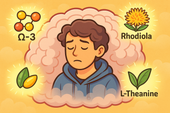
Brain Fog and Body Dysmorphic Disorder: Can Nootropic Supplements Help?
Brain fog often accompanies Body Dysmorphic Disorder, clouding focus and deepening emotional fatigue. Nootropic supplements like L-theanine, Rhodiola, and CoQ10 can help restore mental clarity, balance neurotransmitters, and bring calm energy back to the mind 🌿🧠.
-

How Stress Hormones Like Cortisol May Worsen Body Dysmorphic Disorder
Chronic stress floods the brain with cortisol — the hormone that keeps you on high alert. In Body Dysmorphic Disorder, this chemical overdrive fuels anxiety, distorts self-image, and traps the body in survival mode. Calming cortisol helps restore both peace and perspective 🌿🧠.
-

The Role of Neurotransmitters in BDD—and How Supplements May Help
Neurotransmitters like serotonin, dopamine, glutamate, and GABA shape how people with Body Dysmorphic Disorder perceive themselves. When these brain messengers fall out of balance, perception distorts — but targeted supplements can help restore calm, focus, and emotional regulation 🧠🌿.
-

What Is Body Dysmorphic Disorder? A Deeper Look at the Mind-Body Connection
Body Dysmorphic Disorder (BDD) isn’t just about appearance — it’s about perception. When brain chemistry, trauma, and stress distort self-image, the mind begins to see flaws that aren’t truly there. Healing starts by calming the nervous system and reconnecting mind and body 🪞🧠.
-

Keeping Calm in Competitive Sports: How to Train Your Mind, Body, and Chemistry for Peak Performance
Competitive pressure can overwhelm even the strongest athletes — but calm is trainable. By combining supplements like magnesium, L-theanine, and adaptogens with breathwork and mindset training, you can stay focused, balanced, and in control under any level of stress 🧠🏅.
-
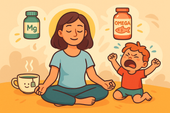
Supplements for Parents Facing Toddler Tantrums: Staying Calm When Little Emotions Run Wild
Toddler tantrums can drain even the most loving parent — but your calm is powerful. With the right supplements like magnesium, L-theanine, and ashwagandha supporting your nervous system, you can stay patient, grounded, and kind, even when emotions run high 🧸🌿.
-

Workplace Stress and Anger Management Support
Workplace stress can quickly turn into frustration — but calm is a skill you can train. By combining supplements like magnesium, L-theanine, and adaptogens with breathwork and mindset tools, you can stay focused, patient, and emotionally grounded no matter how intense the office gets 💼🌿.
-

How to Stay Patient With Family During Stressful Holidays
Holiday gatherings can stir up old stress and test your patience — but calm is possible. With nervous system support from magnesium, L-theanine, and adaptogens, plus mindful breathing and clear boundaries, you can stay centered, kind, and grounded even when family chaos unfolds 🎄💞.
-

Supplements to Keep Calm During Traffic Jams
Getting stuck in traffic doesn’t have to ruin your mood. With calming supplements like magnesium, L-theanine, and ashwagandha, you can train your body to stay relaxed and focused behind the wheel — turning gridlock into a moment of grounded patience 🚗🌿.
-
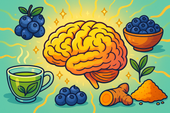
The Role of Antioxidants in Healing Brain Stress from Dissociation
Antioxidants protect the brain from the oxidative stress caused by trauma and dissociation. By neutralizing free radicals and supporting mitochondrial recovery, they help restore clarity, focus, and emotional balance — allowing the mind to heal at the cellular level 🌿🧠.
-
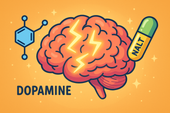
N-Acetyl L-Tyrosine (NALT) for Supporting Mental Clarity
N-Acetyl L-Tyrosine (NALT) fuels dopamine production — the neurotransmitter of focus and motivation. By supporting brain chemistry during stress, NALT helps restore mental clarity, energy, and alertness, making it easier to think clearly and feel present again ⚡🧠.
-

How Ginseng May Improve Focus and Energy in Dissociation
Ginseng helps combat the mental fatigue and fog that often come with dissociation. By supporting mitochondrial energy, balancing neurotransmitters, and regulating cortisol, it gently restores focus, motivation, and emotional presence — helping the mind reconnect with clarity and strength 🌿⚡.
-
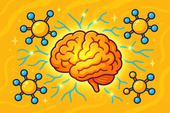
Phosphatidylserine and Dissociation: Supporting Cognitive Function
Phosphatidylserine helps calm the stress response by balancing cortisol, the body’s primary stress hormone. By lowering cortisol spikes, it protects memory, focus, and emotional stability — restoring clarity and mental presence for those struggling with dissociation 🧠🌿.
-
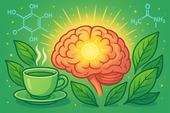
Can Green Tea Extract Help with Dissociative Brain Fog?
Green tea extract may help lift dissociative brain fog by supporting neurotransmitter balance, reducing inflammation, and enhancing energy at the cellular level. With its key compounds EGCG and L-theanine, it promotes calm focus, clarity, and emotional presence — helping you feel more alert and grounded 🍵🧠.
-
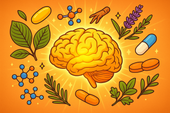
Building a Natural Supplement Stack for Dissociation Support
Building a supplement stack for dissociation means nourishing the brain and body back into communication. By supporting neurotransmitters, gut health, and energy balance through nutrients like magnesium, omega-3s, curcumin, and probiotics, you can help restore clarity, calm, and connection — one layer at a time 🌿🧠.
-

Chamomile and Lavender for Dissociative Anxiety Relief
Chamomile and lavender work together to calm dissociative anxiety by soothing the nervous system and restoring emotional safety. Their natural compounds balance cortisol, enhance GABA activity, and activate the vagus nerve — helping you feel grounded, connected, and at peace again 🌿💜.
-
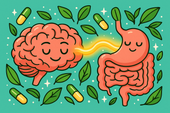
Probiotics and Dissociation: Exploring the Gut–Brain Axis
The gut–brain axis plays a vital role in emotional awareness and presence. When the microbiome is balanced, it supports serotonin production, vagus nerve activity, and calm focus. Probiotics help repair this connection — restoring safety, clarity, and the feeling of truly being in your body again 🌿🧠.
-
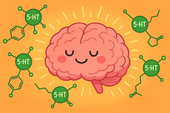
5-HTP for Dissociation: Supporting Serotonin and Emotional Stability
5-HTP helps bridge the gap between emotional numbness and stability by supporting serotonin production — the neurotransmitter that shapes mood, sleep, and sensory awareness. For people experiencing dissociation, 5-HTP may gently restore connection, presence, and emotional balance from the inside out 🌿🧠.

















































